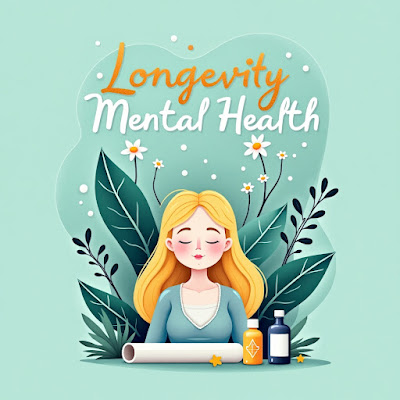The mind and body share an intrinsic connection that profoundly influences overall health and longevity.
For women over 40, managing stress and nurturing mental well-being can be as crucial as physical exercise and nutrition. This article explores how mental health impacts aging, the biological effects of stress, and practical biohacking techniques to achieve a balanced mind and body.
1. The Role of Mental Health in Longevity
Robust mental health supports a strong immune system, improves sleep quality, and promotes healthy hormonal balance. Stress and anxiety can trigger inflammatory responses that accelerate aging, making mental well-being a key factor in longevity.
Engaging in activities that challenge the brain—such as learning new skills, puzzles, or even creative hobbies—can foster neuroplasticity. This helps maintain cognitive function, memory, and overall brain health well into later years.
2. Understanding Stress and Its Biological Impact
When the body perceives a threat, it activates the “fight or flight” response, releasing stress hormones like cortisol. While this response is essential in short bursts, chronic stress leads to hormonal imbalances, sleep disturbances, and increased inflammation.
Long-term elevated stress levels can contribute to:
- Accelerated Aging: Increased oxidative stress and cellular damage.
- Hormonal Imbalances: Disruptions in estrogen and other hormone levels.
- Compromised Immune Function: Higher susceptibility to infections and chronic diseases.
- Mental Fatigue: Reduced cognitive function and memory issues.
3. Biohacking the Mind – Techniques for Stress Reduction
Mindfulness practices and meditation have been shown to reduce stress, lower cortisol levels, and improve emotional regulation. Regular practice can lead to lasting changes in the brain's structure and function, enhancing overall mental resilience.
- Guided Meditation: Use apps or online resources to follow guided sessions.
- Breathing Exercises: Techniques like deep diaphragmatic breathing can quickly reduce stress.
- Mindfulness Walks: Combine physical activity with mindful awareness of the present moment.
Documenting thoughts and feelings can help identify stress triggers and patterns. Techniques borrowed from cognitive behavioral therapy (CBT) can reframe negative thoughts and build a positive mindset.
4. Integrating Stress Management into Daily Life
A consistent daily schedule that includes periods of rest and relaxation can significantly lower stress levels. Whether it’s setting aside time for a quiet cup of tea or a daily meditation session, regular downtime is essential.
Spending time in nature has a calming effect on the mind. Likewise, maintaining social connections and engaging in supportive communities can reduce feelings of isolation and enhance emotional health.
Wearable devices and smartphone apps can track sleep quality, heart rate variability, and stress levels. Data from these tools can guide personalized interventions, ensuring that mental health practices are effective and well-timed.
5. Lifestyle Practices to Support a Healthy Mind
Sleep is a cornerstone of mental health. Aim for 7–9 hours of restorative sleep per night, and consider practices like a consistent bedtime routine and a sleep-friendly environment (cool, dark, and quiet).
Regular exercise not only strengthens the body but also releases endorphins—natural mood enhancers that alleviate stress. A balanced fitness routine combining cardio, strength training, and flexibility exercises can enhance both physical and mental well-being.
Foods rich in omega-3 fatty acids, antioxidants, and vitamins (like leafy greens, berries, nuts, and fatty fish) support brain health. Avoiding excessive sugar and processed foods can prevent energy crashes and mood swings.
6. Exploring Emerging Biohacks for Mental Resilience
Emerging technologies such as neurofeedback allow users to train their brainwave patterns, promoting relaxation and reducing anxiety. Similarly, brainwave entrainment using specific sound frequencies can aid in meditation and stress reduction.
Herbs like ashwagandha, rhodiola, and holy basil have adaptogenic properties that help the body manage stress. These supplements can balance cortisol levels and support overall mental clarity.
VR platforms now offer immersive meditation experiences that transport users to serene environments, helping to reduce stress and boost mindfulness in a highly engaging way.
a. Mental Well-Being and Physical Health:
b. Neuroplasticity and Aging:
a. The Stress Response:
b. Effects of Chronic Stress:
a. Mindfulness and Meditation:
b. Journaling and Cognitive Behavioral Techniques:
a. Structured Routine and Downtime:
b. Nature and Social Connection:
c. Technology-Assisted Biohacks:
a. Quality Sleep:
b. Physical Activity:
c. Nutrition for Brain Health:
a. Neurofeedback and Brainwave Entrainment:
b. Adaptogenic Herbs:
c. Virtual Reality (VR) Meditation:
A healthy mind is a powerful ally in the quest for longevity. For women over 40, the intentional practice of stress management and mental well-being not only reduces the risk of chronic illness but also enhances quality of life. By incorporating mindfulness, structured relaxation, social connection, and innovative biohacking tools, it is possible to mitigate the effects of stress and promote a harmonious balance between mind and body.
In our next article, we will delve into Article 6: Hormone Harmony – Balancing Endocrine Health for Lifelong Vitality.












0 Comments